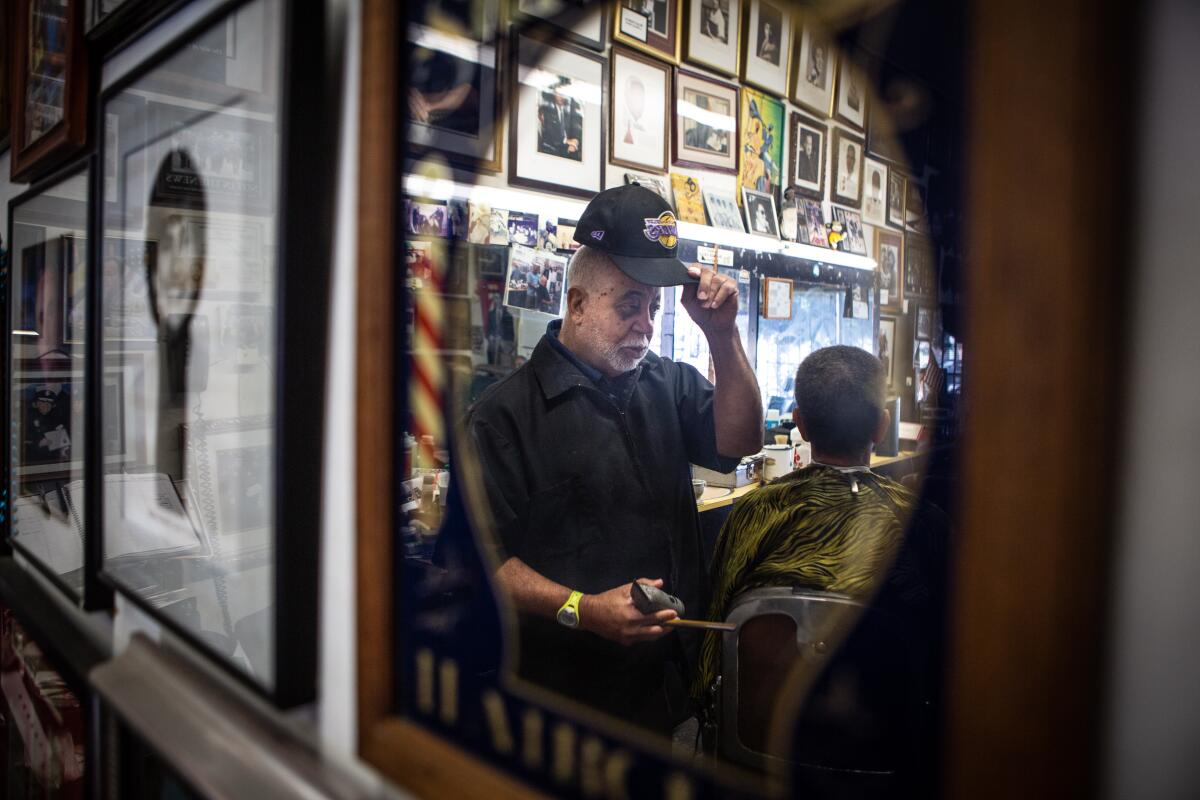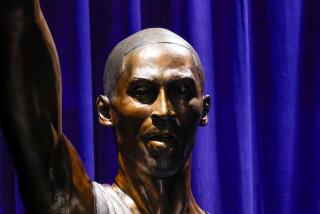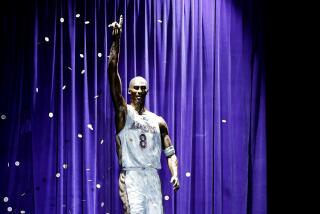The day after his death, the talk at barbershops in L.A. was about Kobe and his legacy

Alexander Toney had just walked into the grocery store with his family on Sunday when he first heard rumors that Los Angeles Lakers legend Kobe Bryant may have died.
At first, the South L.A. barber didn’t believe it, saying he thought TMZ’s reports weren’t credible. But after more outlets confirmed that not only Bryant, but his 13-year old daughter, Gianna, and seven others died in the fiery helicopter crash, the grim reality sunk in.
As they walked down the aisles getting their food, he said he wrapped his arms around his four kids more tightly than usual.
On Monday, he was back to work at Black Hollywood Barbering Co. near Inglewood, where he and his boss are preparing to move to a bigger location. Among themselves, they talked about Bryant, 41, his legacy and the footprint he left in the city. And with his clients, most of whom are also black men, he expects Bryant will be a hot topic in the chair.

“A lot of them are going to probably want me to cut a design of his face in their head,” Toney said.
Across the country, black men grieved Bryant’s death and celebrated his life in different ways. NBA players switched numbers. Fans laid wreaths and flowers at Staples Center. Coaches and broadcasters’ voices cracked as they fought back tears attempting to confine Bryant’s impact into soundbites.
But Los Angeles barbers expect to play a part in the healing process too. Their shops, which can be battlegrounds for heated debates, are likely to become forums to discuss how to live up to Bryant’s example. It’s one that people will have to work to emulate, Toney said.
“Whether he tried to be or not, he was a leader, and people respected that and followed him for it,” said Toney, 40. “To an extent, we’re all slackers. I’ll put off something today and before you know it, I’ll have put it off for a year. With Kobe, if he wanted to do something, he was going to do it then and there. That’s something you respect and look up to.”
Bryant’s competitive edge is well documented. But the five-time champion wasn’t always the star in Los Angeles. William Taylor, 72, a frequent client at Tolliver’s Barber Shop on Florence Avenue in South L.A., recalled the four airballs Bryant heaved during the closing minutes of a playoff game in 1997, his rookie year. That embarrassing moment could have crippled Bryant’s young career. And in 2003, Bryant was accused of rape, in a case that was later dropped after the woman refused to testify. Bryant settled an ensuing civil suit and apologized without admitting guilt.
Taylor said he felt Bryant handled the ebbs and flows of being under the Los Angeles microscope with maturity.
Not many could have done that, he said.
“We watched him grow up,” Taylor said. “As black men, we were always constantly beaten down, and we continue to be beaten down. But to see Kobe become a winner with our own eyes from afar was awesome. He was like an adopted son to us.
“Was he a saint? No. But my Bible says ‘All have sinned and fall short of the glory of God.’”
The shop’s owner, Lawrence Tolliver, 75, said he never wears hats while he’s at work. But on the day after Bryant’s death, he proudly wore a black cap with the Lakers’ purple and gold logo. As he trimmed an older gentleman’s hair with his clippers, Tolliver said he felt as if “we lost a part of L.A.”
Tolliver said he appreciated Bryant’s basketball achievements, including the championships, 18 All-Star game selections and two Olympic gold medals.
But Bryant’s life after retiring in 2016 was just as, if not more, impactful, Tolliver said. Seeing the investment he put into his family made him proud, the barber said. He also liked how Bryant passed his knowledge on to younger stars, including LeBron James and Dwayne Wade. His commitment to excellence on and off the court inspired him, Tolliver said.
“We’re older, so we can appreciate everything he’s done through a historical context,” said Tolliver, who has been cutting hair for more than 50 years. “But it didn’t dawn on me until now how much this generation really loved and idolized him.”
LeVar Sommerville, a barber at the Player’s Lounge off Melrose Avenue, said business had been slow for a Monday afternoon but the atmosphere was still somber. Clients didn’t want to talk about Bryant’s death, saying it was too soon. He too got emotional thinking about it, he said.
“I have a daughter, so it’s crushing to see those pictures of him and Gianna,” Sommerville, 40, said. “At a certain point in life, it becomes less about you, and more about the people around you. He was becoming more of a family man and put so much energy into getting closer with them. I think that’s where the sadness comes in.”
But when people are ready to talk, Sommerville thinks they’ll have a different attitude. The age-old question of who was better — Bryant, James or Michael Jordan, will inevitably still come up in conversation. But he thinks his clients will be more mindful.
“People come in a barbershop and they feel free,” Sommerville said. “They come here to laugh, and sports will always be a part of that. That discussion is always fun, but it’s going to be hard to do now. It may not be as fun anymore.”
Toney agreed, saying people will “probably be more respectful.”
And when clients come in, he’s ready to have those talks, or any discussion about Bryant, at their pace.
“Everyone is looking for that figure to look up to,” Toney said. “He led by example and we loved him for it.”
More to Read
Sign up for Essential California
The most important California stories and recommendations in your inbox every morning.
You may occasionally receive promotional content from the Los Angeles Times.











